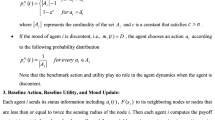Abstract
In this paper, the distributed energy consumption optimization of sensors in wireless sensor network (WSN) is studied. The access point selection for sensors is critical to the energy consumption because of the limited scope of wireless communication. Due to the high complexity of the central optimization, the desired approach of optimization is the distributed one with lower computation complexity. A game model is proposed for the energy efficient AP selection problem, which is proved to be an exact potential game. Also, a distributed learning algorithm is proposed to achieve the globally optimum in a distributed manner. Simulation results show that the proposed would improve the energy efficiency in the WSN.




Similar content being viewed by others
References
Wu, Q., Ding, G., Xu, Y., Feng, S., Du, Z., & Wang, J. (2014). Cognitive internet of things: A new paradigm beyond connection. IEEE Internet of Things Journal, 1(2), 129–143.
Agrawal, S., & Das, M. L. (2011). Internet of things: A paradigm shift of future internet applications. Ahmedabad: Institute of Technology, Nirma University.
Lin, F., Liu, Q., Zhou, X., Chen, Y., & Huang, D. (2014). Cooperative differential game for model energy-bandwidth efficiency tradeoff in the internet of things. China Communications, 11(1), 92–102.
Serbulent, T., Murat, S., & Wei, M. (2012). Wi-Fi enabled sensors for internet of things: A practical approach. IEEE Communications Magazine, 50(6), 134–143.
Sanchez, L. T., Ranasinghe, D. C., & Harrison, M. (2012). Adding sense to the internet of things. Personal and Ubiquitous Computing, 16(3), 291–308.
Roman, R., Alcaraz, C., & Lopez, J. (2011). Key management systems for sensor networks in the context of the internet of things. Computers and Electrical Engineering, 37(2), 147–159.
Chen, Z., Wang, H., Liu, Y., et al. (2012). A Context-aware routing protocol on internet of things based on sea computing model. Journal of Computers, 7(1), 96–105.
Danieletto, M., Bui, N., & Zorzi, M. (2012). Improving internet of things communications through compression and classification. In Proceedings of the 2012 IEEE International Conference on Pervasive Computing and Communications Workshops.
Li, S., & Fan, C. (2011). Joint optimization on energy and delay for target tracking in internet of things. China Communications, 8(1), 20–27.
Duan, J., Gao, D., Yang, D., Foh, C. H., & Chen, H. (2014). An energy-aware trust derivation scheme with game theoretic approach in wireless sensor networks for IoT applications. IEEE Internet of Things Journal, 1(1), 58–69.
Fudenberg, D., & Levine, D. K. (1998). The theory of learning in games. Cambridge: The MIT Press.
Suris, J., Dasilva, L., Han, Z., Mackenzie, A., & Komali, R. (2009). Asymptotic optimality for distributed spectrum sharing using bargaining solutions. IEEE Transactions on Wireless Communications, 8(10), 5225–5237.
Zhang, Z., et al. (2008). A cooperation strategy based on Nash bargaining solution in cooperative relay networks. IEEE Transactions on Vehicular Technology, 57(4), 2570–2577.
Zheng, J., et al. (2014). Optimal power allocation and user scheduling in multicell networks: Base station cooperation using a game-theoretic approach. IEEE Transactions on Wireless Communications, 13(12), 6928–6942.
Xu, Y., Wang, J., Wu, Q., Anpalagan, A., & Yao, Y.-D. (2012). Opportunistic spectrum access in cognitive radio networks: Global optimization using local interaction games. IEEE Journal of Selected Topics in Signal Processing, 6(2), 180–194.
Dai, H., Huang, Y., & Yang, L. (2015). Game theoretic max-logit learning approaches for joint base station selection and resource allocation in heterogeneous networks. IEEE Journal on Selected Areas in Communications, 33(6), 1068–1081.
Stuber, G. (2001). Principles of Mobile Communications (2nd ed.). Norwell, MA: Kluwer.
Nowak, M. A. (2006). Five rules for the evolution of cooperation. Science, 314, 1560–1563.
Santos, F. C., Santos, M. D., & Pacheco, J. M. (2008). Social diversity promotes the emergence of cooperation in public goods games. Nature, 454, 213–249.
Marden, J., Arslan, G., & Shamma, J. (2009). Cooperative control and potential games. IEEE Transactions on Systems Man and Cybernetics Part B, 39(6), 1393–1407.
Maskery, M., Krishnamurthy, V., & Zhao, Q. (2009). Decentralized dynamic spectrum access for cognitive radios: Cooperative design of a noncooperative game. IEEE Transactions on Communications, 57(2), 459–469.
Altman, E., Jimenez, T., Vicuna, N., & Marquez, R. (2008). Coordination games over collision channels. In Proceedings of WiOPT (pp. 523–527).
Zhong, W., Xu, Y., & Tianfield, H. (2011). Game-theoretic opportunistic spectrum sharing strategy selection for cognitive MIMO multiple access channels. IEEE Transactions on Signal Processing, 59(6), 2745–2759.
van Laarhoven, P. J. M., & Aarts, E. H. L. (1987). Simulated annealing: Theory and applications. Holland: Reidel.
Young, H. P. (1998). Individual strategy and social structure. Princeton, NJ: Princeton Univ. Press.
Raychaudhuri, D., & Mandayam, N. B. (2012). Frontiers of wireless and mobile communications. Proceedings of the IEEE, 100(4), 824–840.
Author information
Authors and Affiliations
Corresponding author
Rights and permissions
About this article
Cite this article
Peng, H., Duan, Y., Shao, Q. et al. Game theory based distributed energy efficient access point selection for wireless sensor network. Wireless Netw 24, 523–532 (2018). https://doi.org/10.1007/s11276-016-1350-8
Published:
Issue Date:
DOI: https://doi.org/10.1007/s11276-016-1350-8




